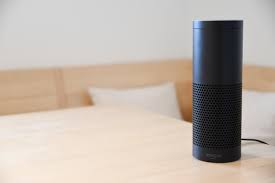
Amazon plans to upgrade personal assistant into ‘Dr. Alexa.’
New Concept Enables Alexa to Provide Medical Advice, Support
“She” can track blood glucose levels, describe symptoms, access post-surgical care instructions, monitor home prescription deliveries and make same-day appointments at the nearest urgent care center. Alexa can even listen to breathing and draw conclusions.
Alexa, Amazon’s digital assistant, has made an impact on many lives. It’s easy to say, “Alexa, find me a health website,” or “Hey Echo, call Joe,” but its latest advance will literally change lives. A story on khn.org by Janet Rae-Dupree describes a radical upgrade of Alexa’s medical skills.
According to Rae-Dupree, Amazon has partnered with numerous health care companies, including several in California, to let consumers and employees use Alexa for health care purposes. Workers at Cigna Corp. can manage their health improvement goals and earn wellness incentives with Alexa. The personal assistant also helps people who use Omron Healthcare’s blood pressure monitor, HeartGuide, to track their readings.
But a flood of new opportunities are emerging since Alexa won permission to use protected patient health records controlled under the U.S. privacy law known as the Health Insurance Portability and Accountability Act (HIPAA). Anyone with an assistant can sign of for these health care services. Analysts expect 55% of U.S. households will have smart speakers by 2022.
University of Washington researchers recently published a study in which they taught Alexa and two other devices—an iPhone 5s and a Samsung Galaxy S4—to listen for so-called agonal breathing, the distinct gasping sounds that are an early warning sign in about half of all cardiac arrests. These devices correctly identified agonal breathing in 97% of instances, while registering a false positive only 0.2% of the time.
Because Amazon also holds patents on monitoring blood flow and heart rate through an Alexa-enabled camera, Alexa can send vitals to a doctor’s office before a patient heads to an appointment. Then Alexa can continue to monitor a patient’s condition after they get home. It can save patients time, money, and effort by having some pre-care and aftercare done digitally.
In a 2018 interview on Amazon’s corporate blog, Rohit Prasad described Alexa’s anticipated evolution using “federated learning” that lets algorithms make themselves smarter by incorporating input from a wide variety of sources.
“With these advances, we will see Alexa become more contextually aware in how she recognizes, understands and responds to requests from users,” Prasad said.
Filling the Health Care Gaps
In another article on healthcare and using digital assistants at www.zdnet.com says the health industry is moving towards “virtual care” because of the high cost of visiting the growing number of older people in their homes. “Virtual nurses” are not replacing home visits, they are augmenting the nurses who make regular voice calls to check up on them.
Phoenix-based non-profit organization, G60 Trauma will start testing Addison Care with 500 patients in January. G60 Trauma “exists to optimize the recovery of people aged 60 years or older who have experienced a traumatic injury.” The most common causes are falls and car accidents.
For those still struggling to get adequate health care face-to-face with a medical professional, this might be the breakthrough needed.
read more at zdnet.com







Leave A Comment